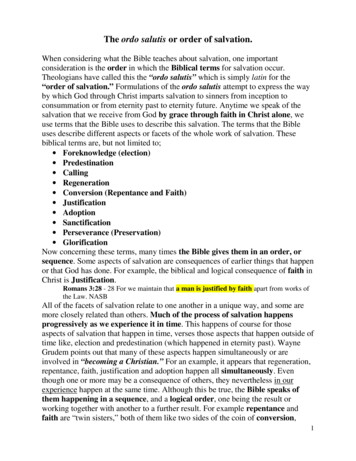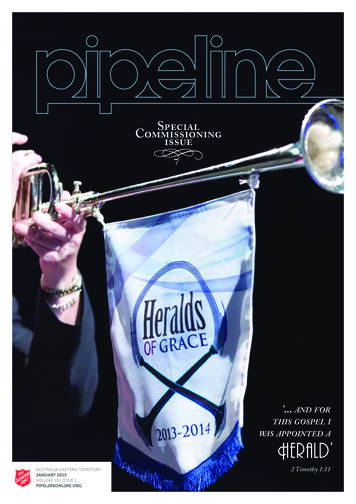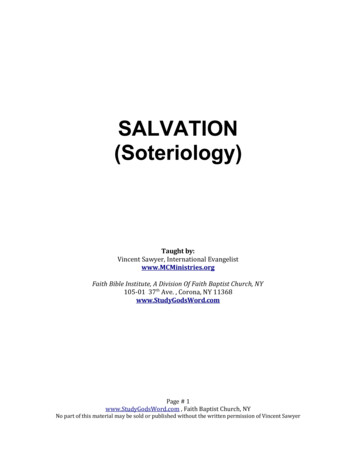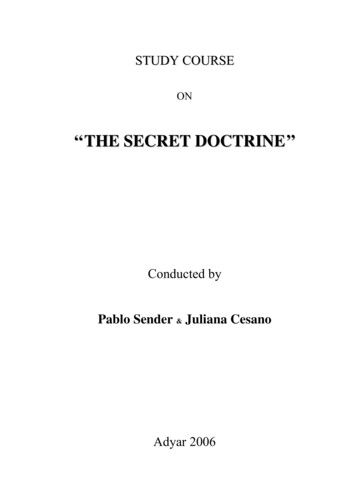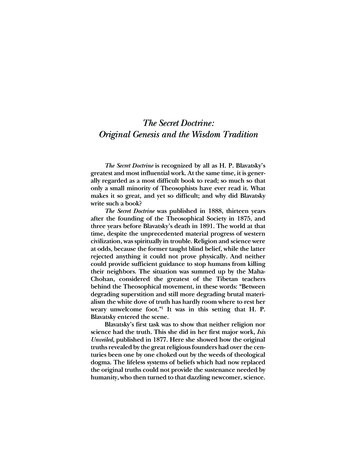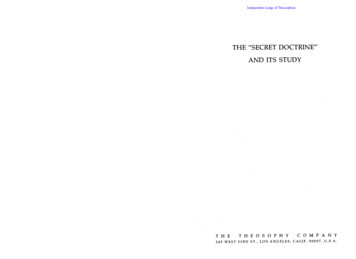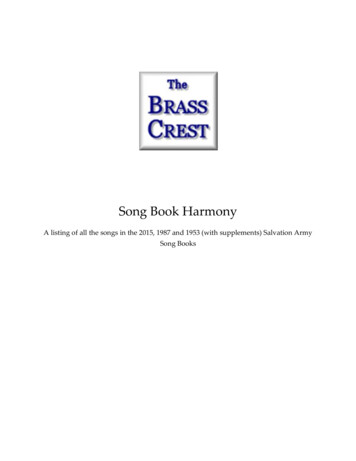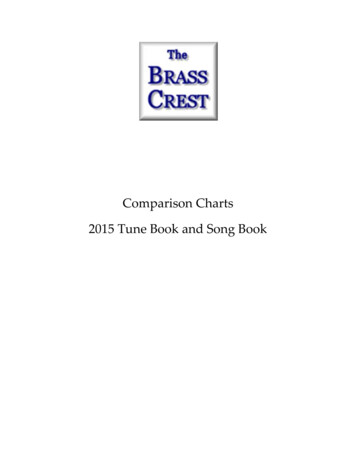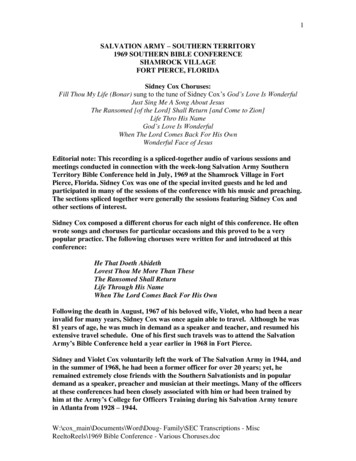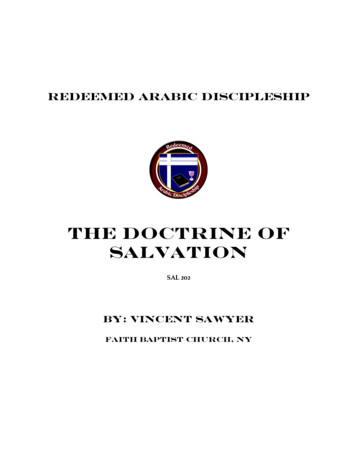
Transcription
TRedeemed Arabic DiscipleshipThe Doctrine ofSalvationSAL 202By: Vincent SawyerFaith Baptist Church, NY
The Doctrine of SalvationWeekly HomeworkREADING: Basic Theology by Charles C. Ryrie All of Grace by C.H. SpurgeonTERM PAPER: A five-page, double-spaced, end-noted typed paper is required(See topics below)BIBLE MEMORY VERSES: (related to the doctrine of salvation)Memory Verse:II Corinthians 4:4; Galatians 2:16; John 6:37II Thessalonians 2:13 Acts 26:18 Ephesians 2:8-10I Corinthians 15:3-4 I Peter 3:18II Corinthians 5:21 James 2:17-18 Romans 8:30II Thessalonians 2:13 --II Corinthians 5:21Hebrews 9:22 –PAPER TOPICS:1.2.3.4.5.6.7.The depravity of manThe essentials of the Gospel messageThe substitutionary death of ChristThe results of salvation (a faith that works)Assurance of salvation (How do I know I'm saved?)Eternal security (Can I ever lose my salvation?)You can do a detailed study of any of the passages below (describe thecontext; word definitions; parallel passages; give illustrations andapplications)James 2:14-26John 10:27-28
The Doctrine of SalvationCONDEMNATION: The Desperate NEED for Salvation(He saw me!)ELECTION: The Eternal PLAN for Salvation(He chose me!)REDEMPTION: The Gracious PROVISION for Salvation(He bought me!)JUSTIFICATION: The Personal IMPUTATION of Salvation(He justified me!)REGENERATION: The Immediate BLESSINGS of Salvation(He renewed me!)SANCTIFICATION: The Resultant FRUITS of Salvation(He changes me!)PRESERVATION: The Eternal SECURITY of Salvation(He keeps me!)GLORIFICATION: The Future GLORY of Salvation(He will clothe me for Heaven!)
SALVATIONINTRODUCTION:The testimony of Paul - "The saying is trustworthy and deserving of fullacceptance, that Christ Jesus came into the world to save sinners; of whom I amthe foremost" (I Timothy 1:15).The doctrine of salvation is (as far as the sinner is concerned) the most importantand most comprehensive doctrine taught in Scripture. This doctrine encompassesseveral other Scriptural teachings which are vitally linked to Biblical salvation-such as the doctrine of God (whose holiness necessitates salvation), the doctrine ofChrist (whose deity, death, and resurrection make salvation possible), the doctrineof the Holy Spirit (whose power imparts salvation), the doctrine of the Bible (thetruths of which are the basis for salvation), and the doctrine of the future (thepromises regarding this give future confidence of salvation).The doctrine of salvation is a very broad and very deep subject, yet is so simplethat a little child can understand its essential truth.This study makes no pretense at being exhaustive, but will unfold the major Bibletruths involved in salvation so that the student will:1. Gain confidence in his/her own personal salvation2. Rejoice in the benefits and blessings of salvation3. Discern the errors propagated by the cults and other false teachers regardingsalvation4. Exalt and glorify Jesus Christ, the "Author and Finisher" of our salvation
Lesson 1CONDEMNATION: The Desperate NEED for Salvation(He saw me!)The word "salvation" (Greek "soteria"; Hebrew "yasha") means to experiencedeliverance; to be rescued; to be freed or liberated.The question which naturally needs to be asked and answered is: "Delivered fromwhat? Rescued from what? Saved from what?"The salvation which God places so much importance on is salvation from sin andits consequences.In order to understand adequately the doctrine of salvation, one must understandthe Bible's revelation concerning man's sin and its deserved condemnation.This section of notes will briefly cover the following features of sin:1.2.3.4.1)2)3)4)The definition of sinThe essential nature of sinThe Biblical terms for sinThe inheritance of sin5. 5) The intensity of sin (depravity)6. 6) The penalty of sinA. The DEFINITION of Sin1. The world's wrong philosophic definitions or theories of sin:a. Dualism - Sin is an eternal principle of evil, locked into battle with God,who is good (ancient Greeks; Gnosticism)b. Privation - Sin is being deprived of certain righteous tendencies andmaterial necessities (Leibnitz)c. Illusion - Sin is man's wrong perception about himself and God due to hisfiniteness (Spinoza)2. The Bible's definition of sin:
"Sin is any lack of conformity to the moral law of God, either in your actions,your attitudes or your nature."Definition explained:a. "Lack of conformity" - To fall short of God's standard or to miss the markeither by sins of omission or commission(Rom. 3:23).b. "Moral law" - All that God demands of men because of His holiness,whether explicitly recorded in Scripture or implicitly "written on theirhearts." (Exodus 20; Rom. 2:15)c. "Your actions" - To intentionally or unintentionally do some wicked action(I John 3:4)d. "Your attitude" - To sin in your thoughts, motives, and internal desires(Jer. 17:9; Is. 1:5; Heb. 3:12). The New Testament often focuses more on theman's internal disposition because it is from such that outward actions stem(Mt. 15:19).e. Your "nature" - The state or disposition of the soul which gives rise towicked desires and acts is expressly called "sin" (and refers to the state ofbeing a sinner).Ephesians 2:1ff –Romans 3:9-10 –Romans 7:6, 8-11 NOTE: The Bible teaches that sin existed in the soul of man before he was awareof it, and that the Law simply makes man conscious of sin which already dwells inhim (Romans 7:7-14).*Men are guilty first of all because of what they are ("sinners") and onlysecondarily because of what they do ("sin").The Flow of Sin1) Your Nature2) Your AttitudeSoul/SpiritState of beingThe principle of sinHeart/ThoughtsDispositionThe plot of sinYour Actions"Hand"DeedThe practice of sin
B. The ESSENTIAL NATURE of SinThe word "essence" simply refers to the most fundamental and basic nature ofsomething.From what does man's sin stem? What is the common denominator for all sin?What is sin at its most basic, ultimate core?The essence of sin is selfishness!All forms of sin have their root in selfishness (cp. Strong, p. 569). Selfishness isthe underlying factor behind all sin.There is selfish motivation behind every sin!1. Why is selfishness sin?Basically: selfishness is a violation of the greatest of God's commands (abreaking of the all-encompassing requirement of the Law) -- to love God(Matt. 22:36-40; Rom. 13:8-10; Gal. 5:14).a. Selfishness places self ahead of God.1. Selfishness says: "Me first" not "Thee first." (Luke 9:57-62; it isactually idolatry - Col. 3:5)2. Selfishness says: "My will be done" not "Your will be done"(Mt. 6:10)b. Selfishness places self ahead of others (Phil. 3:21; I Cor. 10:24)3. The manifestation of selfishness:Selfishness basically expresses itself in four ways:a. Lust (coveting for yourself)Motive – Lust is the drive of selfishnessAttitude – Lust says, "I want it!"Scripture - James 1:14-15; EX: David - II Sam. 11:1-5; Ahab - I Kings 21b. Self-pity (feeling sorry for yourselfMotive – Self-pity is the justification of selfishness
Attitude – Self-pity says, "I deserve it!"Scripture - EX: Elijah - I Kings 19c. Strife (being wrongly ambitious for yourself)Motive – Strife is the action of selfishnessAttitude – Strife says, "I will get it!"Scripture - Phil. 1:15-16, 2:3; Ja. 3:14-16d. Pride (showing off yourself)Motive – Pride is the display of selfishnessAttitude – Pride says, "I have it!"Scripture - Daniel 4:30ff4. Illustrations of the essence and nature of sin:a. Satan's most basic temptation: A promise of selfish independence ("Youshall be as God" - Gen. 3:5)b. The "Man of Sin" - "opposing and exalting himself against all that iscalled God" (II Th. 2:3-4).*Victory over selfishness is salvation! II Cor. 5:15; Gal. 2:20)D. The BIBLICAL TERMS for SinGod uses a variety of words to picture the many facets or manifestations of evilinvolved in sin.The following is a partial list:1. Old Testament terms:a. To miss the mark (Jud. 20:16)To fail or come short of God's standard - I Sam. 26:21.
To miss the mark "Chata" is the primary word for sin in the Old Testament - 590times.b. To be bent or crooked (Is. 21:3) A perversion of that which is right - Is.19:14.c. A deviation from a right standardInjustice, dishonesty, or deceitfulness - Mal. 2:6.d. To cross over or move beyond (Deut. 27:3) To transgress or deliberatelystep over a moralboundary (Deut. 17:2; Num. 22:18)e. That which is broken up, destroyed, or ruined (II Ki. 2:19)To do a destructive deed and receive the bad consequences (Jud. 11:27); theinjury done by sin (Is. 45:7).f. To revolt and refuse to submit to a rightful authority - I Ki. 12:19.Rebellion - Is. 1:2g. Confusion or disorder - Job 3:17 Wickedness or criminal wrong - Ps. 1:1h. Nothingness or emptiness, often connected to idols (Hos. 4:15) The vanityand profitlessness of sin - Prov. 22:8i.Stupidity or foolishness (I Sam. 25:17; Ps. 14:1, 74:22)To be spiritually foolish or morally stupid (Deut. 32:1; Is. 32:5, 6)2. New Testament Termsa.b.c.d.e.f.g.h.To miss the mark (Rom. 3:23)To deliberately overstep a boundary (Rom. 2:23, 5:14; Gal. 3:19)To fall away or to sin against light (Eph. 2:1; Heb. 6:6)To refuse to listen; neglect (Heb. 2:3; II Cor. 10:6)To disregard law; lawlessness (II Th.2:8; I Jn.3:4)Moral badness; opposite of good (Rom. 12:17; I Tim. 6:10)Moral evil (Rom.12:9; I Th.5:22; I Jn.2:13-14)Unrighteousness (Rom. 1:18; Ja. 3:6)
i. To hide under a mask; to be ahypocrite; a pretender (Mk. 12:15; I Tim. 4:2)D. The INHERITANCE of SinWhere did my sin nature come from?1. Man's sin nature did not come from God.When God created Adam, He created him "in his own image" (spirituallyand morally perfect) - Gen. 1:26-27; 312. Man's sin nature was passed on from Adam.After Adam sinned, he begat sons "in his own likeness after his image"(Gen. 5:3) (morally corrupt and in need of salvation)3. Adam's sin nature was then inherited by his children and passed down fromgeneration to generation each time a child is conceived in the womb (ps.51:5).4. Adam's sin is imparted to the human race because of mankind's link toAdam. The sin nature is passed on through man's seed ("seminally"); We are"in Adam" (Rom. 5:12-21; I Cor. 15:21).The solidarity of the human race in Adam is the reason for the continuationof the principle of sin. This racial unity is illustrated in Hebrews 7:9, 10 andGenesis 46:26.5. Our own sin is imputed to us when we violate God's Law (Rom. 5:13; Rom.4:8; II Cor. 5:19).The word "impute" is a bookkeeping term which means to charge to one'saccount (II Tim. 4:16).God does not impute Adam's sin to you; rather, He imputes your sin to youraccount.Contrary to the views of many theologians, the Bible does not speak of theimputation of Adam's sin to the human race. However, theimpartation of Adam's sin nature is taught.
Deserved imputation is when someone is credited with their own sin (by merit)Undeserved imputation is when Christ's righteousness is credited to undeservingsinners (by grace) (Rom. 4:3-24; II Cor. 5:21).D. The INTENSITY of Sin (Depravity)Just how sinful is man?Three views:1. Pelagianism teaches: Man is fine(Man is born innocent and capable of obedience)2. Arminianism teaches: Man is sick(Man from birth is defective physically and intellectually, but canvoluntarily choose not to be depraved spiritually)3. Augustinianism teaches: Man is dead(Man is born with a sin nature that renders him dead toward spiritualmatters, and he is totally unable to change his evil tendencies apart from aspecial working of God's grace)The Bible teaches that man is totally and universally depraved.What is depravity?1. Depravity does not mean:a. That an unsaved man has no impulses to do good (Rom. 2:14, 15)b. That an unsaved man never does anything good by human standards (Mt.23:23; Is. 64:6)c. That an unsaved man is as wicked as he possibly could be (Gen. 15:16; IItim. 3:13)d. That an unsaved man will necessarily indulge in every form of sin 2.Depravity does mean:a. That every man has the same potential to fulfill even the vilest of sins (Rom.1:18ff; 3:10-18)(Every man's heart is the same - Jer. 17:9)
b. That by God's standards, there is no spiritual good dwelling in natural man(Is. 64:6; Rom. 3:9, 7:18)When the unsaved do right, it is for selfish purposes, not for God's exclusiveglory (Mt. 6:5; II Tim. 3:4).c. That the corruption of sin permeates and extends to every part of man'sinternal being.1. 1) The mind (Rom. 8:6; I Cor. 2:14, 4:4; Ti. 1:15)2. 2) The conscience (Ti. 1:15)3. 3) The will (Jn. 8:34; Jer. 13:23; Rom. 7:18)4. 4) The heart (Jer. 17:9)5. 5) The spirit (II Cor. 7:1)6. 6) The emotionsThe unsaved are completely without love, which is the basicmotivating factor to do works that please God (I Jn. 4:7-8, 11-19).d. Depravity means that an unsaved man has no possible means of salvation orrecovering within himself (Eph. 2:1, 8; Mt. 19:25-26).Depravity refers to man's total inability to spiritually rehabilitate himself andbecome pleasing to a Holy God.No act of the will of man (by itself) can change his nature or relationship toGod.How extensive is depravity? All men are depraved.1. Proof # 1 - The Bible's statementsa. IKi.8:46b. Eccl. 7:20 c. Is. 53:6 d. Lk. 11:13 e. Rom. 3:10, 23 f. Gal. 3:22 g. IJn.1:8-2. Proof # 2 - The universal need for salvation
a. The fact that all men need atonement (Jn. 3:16, 12:47), repentance(Acts 17:30) and regeneration (Jn. 3:3-5), proves that all men aresinful and lost.b. The fact that all men stand condemned apart from God's saving graceshows that all men are depraved (Jn. 3:18, 36; I Jn. 5:19)Depravity is:Man being chained to a big problemthat he cannot move!E. The PENALTY for SinThe Bible teaches three basic consequences for man's sin:1. Alienation from God2. Death3. Hell and the Lake of Fire1. Alienation from God According to the Bible:a. Unsaved man is lost (Luke 19:10)b. Unsaved man is blind (II Cor. 4:3-4; I Cor. 2:14; Eph. 4:18)c. Unsaved man is defiled (Mt. 12:33-36)d. Unsaved man is dead (Eph. 2:15)e. Unsaved man is condemned (already) (John 3:18)f. Man is under the wrath of God (John 3:36)g. Man is by nature a child of disobedience (Eph. 2:3)h. Man is associated with Satan (John 8:44; Eph. 2:2; II Tim. 2:26)2. DeathThe Bible says: "The wages of sin is death" (Rom. 6:23)a. "Wages" Payment; price; paycheck(The paycheck one receives matches the deeds he performed)b. "Sin" The word "sin" means to fail to reach God's holy standard Rom. 3:23)c. "Death" - Theologically the word "death" basically means separationThe Bible speaks of three phases of "Death."
1. 1) Physical death - Separation of the soul/spirit from the body (James 2:26;Ezek. 18:4)2. 2) Spiritual death - Separation of the soul/spirit from God (Gen. 2:17; Eph.2:1)3. 3) Eternal death - Separation of the soul/spirit/body from God forever(called the "second death" [II Thes. 1:9; Rev. 20:13-15, 21:8])Chart:Physical DeathMAN'S SPIRIT"The wages of sin is death"Spiritual DeathEternal DeathGODGODSIN SIN SINSEPARATES SEPARATES SEPARATES FOREVERMAN'S BODYMAN'S SPIRITMAN'S SPIRIT & BODY3. Hell and the Lake of FirePerhaps the hardest concept for a man to accept is what the Bible says about sinand the condemnation of the sinner.The doctrine of eternal condemnation is a "hard pill to swallow," but neverthelessit is clearly taught in Scripture and must be accepted by faith.a. How did Jesus Christ describe the condemnation of the unbeliever?1. "Gehenna" (referring to a place of burning - Mt. 5:29-30)2. "Destruction" (Mt. 7:13)3. "Outer darkness" (Mt. 8:12a, 22:13)4. "Weeping" (Mt. 8:12b)5. "Gnashing of teeth" (Mt. 8:12c)6. "Destruction of soul and body" (Mt. 10:28)7. "A furnace of fire" (Mt. 13:42, 50)8. "Everlasting fire" (Mt. 25:46)9. "Everlasting punishment" (Mt. 25:46)10. "Their worm dieth not" (Mk. 9:44a)11. "The fire is not quenched" (Mk. 9:44b)12. Luke 16:19-31:
a.b.c.d.e.Eternal conscious torment (v. 23)Eternal unfulfilled desire (v. 24)Eternal memory (v. 25)Eternal hopelessness (v. 26)Eternal loneliness (v. 19-21)"As spiritual life is "conscious existence in communion with God," so spiritualdeath is "conscious existence in separation from God" (Vine, p. 276).b. Other New Testament teaching on the eternity of the unsaved:1.2.3.4.5.6.7."Unquenchable fire" (Mt. 3:12)"Everlasting destruction from the presence of the Lord" (II Thes. 1:9)"The wrath of God which is poured out without mixture" (Rev. 4:10)"Tormented with fire and brimstone" (Rev. 14:10)"Torment. . . forever and ever" (Rev. 19:11)"No rest day nor night" (Rev. 14:11)"Lake of fire" (Rev. 19:20, 20:10, 21:8)c. The sequence of events for those who die without Christ:1) Hell2) Judgment3) Lake of Fire(Hades - Lk. 16; II Pet. 2:4) (Great White Throne - Rev. 20:1-13) (Rev. 20:1415; 21:8)Illustration:1) Local jail cell2) Court trial3) State Penitentiaryd. Two hard questions:1) Why must there be a penalty for sin?Answer: God is holy and just - His holiness demands that sin separate all who areinfected with it from God's holy presence (Hab. 1:3). His justice demands that aviolation of His law be paid for without partiality.
2) Why must the penalty be so severe?Answer: God is holy and just - The severity of God's judgment will match theseverity of man's crime (Rom. 2:5-6, 11).Man's sin is more hideous, more abominable and more extensive than our wicked,deceitful hearts allow us to believe (SEE: Is. 64:1-6; cp. Ezek. 36:17).God's standards are not our standards, i.e. the way He sees things does not alwaysmatch ours. From God's perspective, every sin is seen as an enormous, putrifying,ugly blot of darkness against the backdrop of His pure, brilliantly white holiness.The Judge of all the earth will do right! (Gen. 18:25)Concluding thought: If there is no great penalty for sin, then there is no great needfor salvation! The extreme urgency for man to be saved is based on the reality of aholy God and an eternal judgment.
Lesson 2REDEMPTION: The Gracious PROVISION for Salvation(He bought me!)Fanny Crosby's testimony about redemption:"Redeemed, how I love to proclaim it!Redeemed by the blood of the Lamb;Redeemed through His infinite mercy,His child, and forever, I am."Philip P. Bliss wrote this song about redemption:"I will sing of my RedeemerAnd His wondrous love to me;On the cruel cross He suffered,From the curse to set me free.Sing, oh, sing of my Redeemer,With His blood He purchased me,On the cross He sealed my pardon,Paid the debt, and made me free."A. Redemption DEFINED:The word "redemption" basically refers to the price that was paid to free or bringdeliverance to someone. It was used of freeing captives from captivity and ofdelivering people from torture (Heb. 11:35).
1. Old Testament terms1. To free by the payment of a price (*the emphasis is on the price that is paid)[primarily used with reference to a family obligation]Literal example: the Kinsman Redeemer (Ruth 3:9; 4:4, 6)God's redeeming of people:Psalm 103:4 –Psalm 107:2 –Hosea 13:14 The LORD alone is our RedeemerJob 19:25 Is. 43:14; 44:6, 24; 47:4; 59:20 2. To free by the payment of a price (the emphasis is on the freedom received)[this word may have more overtones of grace than simply because the onewho redeems has no obligation to do so]Literal example: God's redemption of Israel out of Egypt (Deut. 7:8; II Sam.7:23)God's redeeming of people: Ps. 130:7-8 2. New Testament terms:a. lit. to buy out (the emphasis is on the price that is paid)Gal. 3:13 b. lit. to release or free by paying a price (the emphasis is on the freedom,actual deliverance, or liberty that is received [cp. Vine, p. 263])Our Redeemer is Christ (Lk. 2:38, 24:21).The act of redemption was His death (Mt. 20:28; Mk. 10:45).
The price of redemption was His blood (I Pet. 1:18).The result of redemption is release from the bondage of sin (Titus 2:14).The extent of redemption is both Old and New Testament believers (Heb. 9:15).The duration of redemption is forever (Heb. 9:12).NOTE: redemption is a strengthened form which adds even more emphasis to theidea of the deliverance of redemption.The believer's future deliverance is emphasized --Deliverance from God's wrath in the Tribulation (Lk. 21:28)--Deliverance from death by the resurrection (Rom. 8:23; Eph. 1:14; Eph.4:30B. Redemption ILLUSTRATEDGod's plan of redemption is precisely pictured by the Old Testament sacrificialsystem.Animal sacrifice, which began with the fall of Adam (Gen. 3:21, 4:4, 8:20-21,15:9-18), was legislated by the Law of Moses (Lev. 1-6, 16).All Old Testament sacrifices are a picture or symbol of the great sacrifice of JesusChrist on the cross of Calvary.In this way the slain innocent animals foreshadowed or pre-figured the innocentLamb of God whose blood was shed as a substitute sacrifice for the sins of theworld (John 1:29).The substitutionary sacrifice of Christ is the predominant theme of the Bible.Note the following truths which correlate O.T. sacrifices with Christ'ssacrifice:The Sacrifice had to be:1. A voluntary sacrifice(Lev.1:3; Jn.10:15,18)2. A unblemished sacrifice(Exod.12:5; I Pet.1:19)
3.4.5.6.A innocent sacrificeA bloody sacrificeA vicarious sacrificeA satisfying sacrifice(Heb.7:26-27; II Cor.5:21)(Lev.17:11; Heb.9:22)(Lev.16:15-22; Is.53:4,5)(Heb.2:17; Is.53:11)Important note:The O.T. sacrifices could not take away sins (Heb.10:4)While Old Testament animal sacrifices could never remove sin and spiritual guiltfrom the offerer (Heb. 10:4, 11), those sacrifices did provide an "atonement" (Lev.4:35, Num. 15:25, 26)."The Scriptures tell us that something really did happen to the Israelite offererwhen he came to the right alter with the appropriate sacrifice. What happened wastemporal, finite, external, and legal -- not eternal, infinite, internal, andsoteriological" (Dr. John C. Whitcomb, Israel My Glory, April 1987, p. 13).OLD TESTAMENT ANNUAL SACRIFICES (One Time Per Year)Two Key Days which illustrate the perfect Sacrifice - Jesus Christ, whocleansed us once and for all timeNAMERITUALCelebrated onthe 14th day offirst month.1) The lambwas w/outPassoverblemish(Lev. 23:4- (Exod.12:5; IPet.1:19)5;Exod.12:12) The lamb13)was killed(Exod.12:6;John 12:24,27)3) The lamb'sblood appliedSACRIFICEMEANINGSYMBOLChrist is ourSacrifice was roasted infire and totally eaten by Theofferers and families. deliverance ofThe blood wasChrist'ssprinkled on the door sacrificeposts.PassoverLamb(Jn. 1:29;Mt. 26:1729; I Cor.5:7)
Yom(Exod.12:7;Heb.9:22)Celebrated onthe 10th day ofThethe 7th month. One goat was sacrificedforgiveness of(bearing the penalty ofChrist's1) The priestsin).sacrificedid all the work(cp. Heb. 1:3)Christ is ourscape goatwhoremoved oursin2) The priest offeredfor himself (v. 11)(Christ didn't need to Heb. 7:26, 27)Kippur(Day ofAtonement)(Lev. 16:1-34)3) Two goats for sinoffering: a) 1st goat slainThe other goat was led into thewilderness never to be seenIIb) 2nd goat - sin-bearer again (picturing the removal of Cor.5:21sin).(v. 21-22)(v.15-19)Christ became our Sinbearer (Is.53:4,12; IPet.2:24; Jn.1:29)4) The blood sprinkledin Holyof Holies (v. 27) (Heb.9:7, 11-14)NOTE: The word "atonement" found 16 times in Lev. 16 means to cover (cp. Gen.6:14; Lev. 17:11). The Old Testament saints were saved "on credit" in anticipationof the cross (Heb. 10:4, 11). Old Testament sacrifices covered sin; Christ's bloodcleanses from (removes, takes away) sin (Jn. 1:29; I Jn. 1:7)
OLD TESTAMENT SACRIFICESA 5-Dimensional View of the Perfect Sacrifice Jesus Christ, Who Cleanses UsDailyNAMERITUALSACRIFICE--Voluntary offer -BurntLaying on of hands Offering -Slain by offerer -- Totally burned"Wholly consumed"Blood poured -(Lev. 1:1- Animal totally(Cp. Rom. 12:12)17)burned upMeal--Fine flour mixedA pure gift to Godwith frankincense,(cp. Heb. 10:14)oil,salt(noleaven)(Lev. 2:116)--Spotless lamb orgoatA peacefulfellowship betweenPeace--Laying on ofGod and manOffering hands --Slain byoffender(cp. Rev. 3:20)(Lev. 3:117)--Part sacrificed/parteatenOfferingSinOffering Offering was burnt(Lev. 4:1- outside the camp (v.5:13; cp. 11, 12, 16:27)6:25-30)MEANINGThe fullnessof Christ'ssacrificeSYMBOLChrist wasthecompletesacrifice(Heb. 10:5-7)Christ wasThethe perfectflawlessnesssacrificeof Christ's(Heb. 7:26sacrifice27)Christ is ourThepeace withfruitfulness ofGod (Col.Christ's2:20;sacrificeEph. 2:17)For sins committedagainst God'sCovers thecommands (general principle ofatonement) (cp. IsinPet. 2:24)Christ is theatonement forsin's guilt(Heb. 13:1112; Jn. 19:1720)
TrespassOffering An offering plusrestitution is given(Lev.(5:16, 6:5)5:14;6:7)For sins committedagainst God's "holyChrist is thethings" and againstatonement forCovers theHis commandssin's damagepractice of sin(specific atonement)(Is. 53:10)(cp. I Jn. 1:9)NOTE:1. The first three offerings (burnt, meal, and peace) are called a "sweet smellingsavour"(cp. Eph. 5:2 - Christ became a "sweet smelling savour" to the Father).2. The last two offerings (sin, trespass) are called a "non-sweet savour" (cp. II Cor.5:21; Gal. 3:13 - Christ became a sin offering and a curse for us).C. Redemption PROVIDEDChrist provided our redemption (and fulfilled the Old Testament prophetic symbolsand types of animal sacrifice) by giving His life as the purchase price necessary torelease man from the penalty, power, and--one day--from the presence of sin.Jesus Christ's substitutionary death/shedding of blood was the redemption price.1. The Substitutionary Death of Christa. Christ's death for sinners was a predicted event1. Abraham by faith said to his son Isaac: "God will provide for Himself thelamb for a burnt offering" (Gen. 22:8). Note: Abraham's offering of Isaac onMount Moriah was not only a test of faith (Heb. 11:17-19), it was aforeshadowing of God offering up His "only begotten Son" (Heb. 11:17; Jn. 3:16).2. Isaiah, who lived over 700 years B.C., foretold of Christ's substitutionarydeath with these words:" But he was pierced for our transgressions; he was crushed for ouriniquities; upon him was the chastisement that brought us peace, and withhis wounds we are healed." (53:6)
"The LORD hath laid on him the iniquity of us all" (v. 6) "stricken for thetransgression of my people" (v. 8) "His soul makes an offering for guilt" (v.10)"He shall bear their iniquities" (v. 11)"He bore the sin of many" (v. 12)3. Daniel, speaking of the Messiah's death, said: "an anointed one shall be cutoff, but not for himself" (Dan. 9:26).b. Christ's death for sinners was a fulfilled eventSEE: Matthew 27:27-54By "substitute" we mean that Christ "took the place of us." The death we deserved,He died; the penalty we should have paid, He paid.Two New Testament Greek words emphasize the substitutionary death of Christ:1. To take the place of someone elseMk. 10:45 - "For even the Son of man came not to be served, but to serve, and togive his life a ransom for many." (cp. Mt. 20:28)2. To do something on behalf of someone elseScriptures emphasizing the fact of Christ's substitutionary death:"This is my body which is given for you" (Lk. 22:19)"This cup is poured out for you is the new covenant in my blood" (Lk. 22:20) "Thebread that I will give for the life of the world is my flesh" (Jn. 6:51)"I am the good shepherd: the good shepherd lay down his life for the sheep"(Jn.10:11)"I lay down my life for the sheep" (Jn. 10:15)". . . He (Caiaphas) prophesied that Jesus would die for that nation. . . and not forthat nation only . . ." (Jn. 11:51-52, cp. 18:14)"Christ died for the ungodly" (Rom. 5:6)"Christ died for us" (Rom. 5:8)"He . . . gave him up for us all" (Rom. 8:32)"Christ died for our sins" (I Cor. 15:3)"He made him to be sin for us" (II Cor. 5:21)
"Christ . . . gave himself for our sins" (Gal. 1:4)"Christ . . . loved me, and gave himself for me" (Gal. 2:20)"Christ [was] . . . becoming a curse for us" (Gal. 3:13)"Christ loved us, and gave himself for us a fragrant offering and a sacrifice toGod" (Eph. 5:2)"Christ loved the church, and gave himself up for her" (Eph. 5:25)"Our Lord Jesus Christ. . . died for us" (I Th. 5:10)"Who gave himself a ransom for all" (I Tim. 2:6)"by the grace of God he might taste death for everyone" (Heb. 2:9)"But when Christ had offered for all time a single sacrifice for sins, he sat down atthe right hand of God" (Heb. 10:12)."Christ also suffered for you" (I Pet. 2:21)"Christ also suffered once for sins" (I Pet. 3:18)"Christ suffered in the flesh" (I Pet. 4:1)"He laid down his life for us" (I Jn. 3:16)c. Christ's death for sinners was an important eventThe crux (key truth) of the Gospel message is the substitutionary ("vicarious")death of Christ (I Cor. 15:3; cp. I Cor. 2:2).Christ's death for (in the place of) sinners is the most essential element of God'splan of salvation (In I Cor. 15:3, the words "first of all" mean "first in importance"- showing Christ's substitutionary death and bodily resurrection to be the mostessential contents of the Gospel message).d. Christ's death for sinners was a blessed eventChrist became the sinner's substitute so that we would:1.2.3.4.5.6.7.8.Have life (Jn. 6:51)Be made righteous (II Cor. 5:21)Be delivered from this present evil world (Gal. 1:4)Be redeemed from the curse of the Law (Gal. 3:13)Be resurrected and raptured to live together with him (I Th. 5:10)Be redeemed from iniquity, purified and zealous (Titus 2:14)Have an example to suffer patiently (I Pet. 2:21, 4:1; cp. I Jn. 3:16)Be brought to God (I Pet. 3:18)
2. The Shed Blood of ChristMuch confusion exists today over the issue of the blood of Christ. Debate ragesconcerning the nature and efficacy of Christ's blood. Questions are asked such as:"Is Christ's literal blood efficacious or is His death efficacious or is it both?""Is Christ's blood 'eternal'? or did it originate at His conception in the womb ofMary?""When we sing 'Are You Washed in the Blood?', 'Saved by the Blood,' 'There isPower in the Blood,' 'Nothing but the Blood,' etc., what blessed truth are wecommunicating?"To answer these questions, the student of God's Word must not speculate and gobeyond w
The doctrine of salvation is a very broad and very deep subject, yet is so simple that a little child can understand its essential truth. This study makes no pretense at being exhaustive, but will unfold the major Bible truths involved in salvation so that the student will: 1. Gain conf
